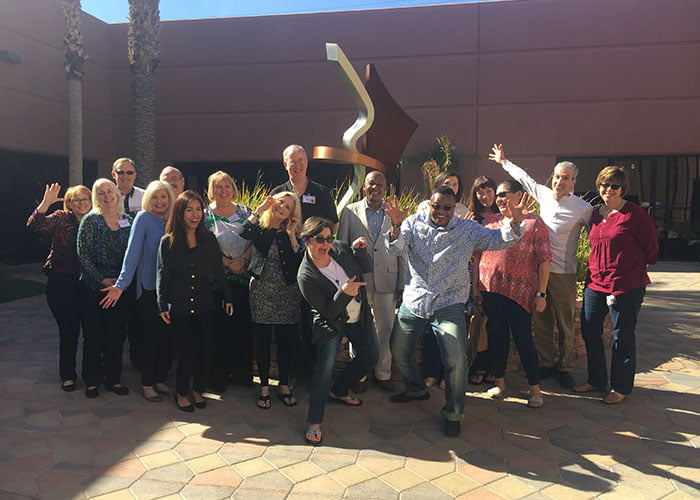Appreciative Process (AP), as defined by Bushe (1991)¹, is a change in “looking”. Our evolutionary biology and neurology play tricks on us. Instead of seeing things as they are, our negativity bias² means we more often than not default to primarily seeing what is wrong. And yet, paradoxically, we flourish when we are feeling good. Appreciative Process is an antidote to our negativity bias. Instead of only focusing on what we don’t want, it invites us to look for what we do want. It encourages this – not to ignore or minimise potential threats; but rather the exact opposite: to NOT IGNORE what is valuable that can so easily be overlooked.
Put differently, our motivation for appreciation is not to deny what is challenging or unjust. Rather, it is to connect us with the whole picture and the resources (intelligence and energy) with which to address that which is difficult skilfully and to grow (appreciate also means to increase) that which is vital.
The classic example Bushe gives is thinking of a person who troubles us. We are usually clear about what we don’t like or appreciate about someone – what we want less of. But, what do we want more of instead? 1. Identify that. 2. Start looking for that too. 3. Notice and acknowledge those moments – however small – and see what happens.
For an auditory learner like me, the Appreciative Process is also about the language – from self-talk to dialogue questions – that directs the way I look at life. Through the years, I’ve come to think of the AP as the re-iterative 3 key questions we re-use, re-cycle and regenerate as part of our appreciative stance. And these questions can be asked at any level, whether we are doing an entire 5-D AI Summit with 1000 people, or simply by ourselves reflecting on our day.
The 3-key questions can be used to inquire into any topic of Inquiry. It can also be applied to reframe questions we typically ask, into more generative questions that mine what we value most, and increase its value in the process of doing so.
- Best Experiences (past):
What was the best experience you’ve had (specific to whatever the topic of inquiry is)? Tell the story in detail. Why was this experience so exceptional? What was it about the situation? What was it about you and the others involved that made it possible? - Values (present):
Why is this particular story so meaningful? What makes it significant? What does it say about what you really value? What do you most want more of? - Wishes (future):
What does this say about your wishes for the future? What does the ideal future look, sound and feel like to you? In relation to a specific topic of inquiry, what would the ideal outcome be? Imagine those exceptional moments (as narrated through the best experience above) becoming the norm, rather than the exception…
The Appreciative Process reveals those stories that can make all the difference, and yet so often remain untold.
¹Bushe, G.R. & Pitman, T. (1991). Appreciative process: A method for transformational change. In: Organization Development Practitioner, 23:3, p.1-4.
² https://www.verywellmind.com/negative-bias-4589618
We invite you to read other posts in Ezelle Theunissen’s series:
The Evolution of Appreciative Agreements: The What We Do, How We Do It, and Who We Become Doing It
Ezelle Theunissen is a community psychologist and coach supporting individuals, teams and organisations align their values, strengths and unique lived experiences towards making a meaningful difference in the world. Social and environmental justice are close to her heart and she favours whole systems and person-centred approaches.


Add your comment now using your favorite social account or Click Here To Login
